Curious about artificial sweeteners and weight gain? Read on for an evidence-based perspective.
For decades, sugar has been named one of the root causes of the so-called increasing “obesity epidemic”. Whether you call it Paleo, Atkins and low-carb, the reality is that people have been going sugar free to lose weight for a long time. Not only are we cutting carbs from our diet, but we’re substituting with non-caloric artificial sweeteners to get our sweet fix. Splenda, Aspartame and all the others I have outlined pros and cons for here have all become part of our regular routine. In fact, a recent study evaluated the consumption of artificial sweeteners in the United States and they found that 25.1% of children and 41.4% of adults consume these sweeteners, most of whom consume them at least once a day. That’s a lot. But as research starts to accumulate, have you ever wondered if maybe ‘diet’ products are in themselves associated with any unwarranted side effects? I dug deep into the research on artificial sweeteners and weight gain to shed some light on this complex topic.
Photo from Live the Live.
What Are Artificial Sweeteners?
Artificial Sweeteners (AS) are very low in absorbable calories which is part of the appeal for consumers who want to lose weight and cut back on sugar. They have a higher intensity of sweetness per gram compared to common caloric sweeteners like sucrose, corn syrup and fruit juice concentrate. Since they’re so much sweeter than your conventional table sugar, you only need very little to reach the desired level of sweetness. Just to give you an example, sucralose (also known Splenda) is a common sweetener and is 600 times sweeter than table sugar. While Artificial Sweeteners are heavily regulated under Canada’s Food and Drug Relations, and Health Canada must approve all AS that are sold in Canada. Here’s a list of all approved artificial sweeteners currently being sold in Canada.
Where Do We Find These Artificial Sweeteners?
AS are widely used in our food supply. Commonly, they’re found in diet soft drinks, yoghurts, desserts and gum. You can also purchase sweetener all on its lonesome to add to baking and beverages.
Benefits of Artificial Sweeteners?
The question remains, why do we consume so much of it and why was it even created in the first place? Well many of these sweeteners were developed as a strategy to limit the consumption of sugar sweetened beverages (SSBs). Our society is obsessed with drinking calories. Everywhere you look there’s a café selling some sort of creamy or a vending machine waiting to dispense a sugar-loaded energy drink. Over time, this obsession with sugar sweetened beverages caught up to us leading to solid research uncovering an association between sweet drinks and obesity. Surprised? No, me neither.
So, food manufacturers went back to the old drawing board to find an alternative: sugarless sugar. These artificial sweeteners were able to mimic the taste of sugar without the extra calories. It’s a Gd damn Christmas miracle!! These sweeteners were able to mimic the taste of sugar, however their impact in our body was very different from conventional sugar. One thing they noticed in particular was that AS don’t really have an impact on our blood sugar. This news became a gold mine in diabetes research and health practitioners since they could now recommend these sweeteners to patients with diabetes. And dentists loved them too! AS also reduced dental caries because they’re resistant to fermentation by oral bacteria. Finally, with virtually no calories in these sweeteners, individuals started to use them to quell their sugar cravings and help them lose weight. The Academy of Nutrition and Dietetics recommends the use of AS and says that they can help one limit energy intake as a strategy to manage weight and/or blood glucose.
There you have it, AS are low in calories to help with weight management, reduce dental caries and don’t affect blood glucose. Sounds like a dream, doesn’t it? Well not so fast… ever since their discovery, skeptics started to re-examine these sweeteners and question the potential long-term effects they may be having in our body. Especially with the steady rise in its use, critics are not yet ready to welcome them with open arms.
Like always, what does the research say?
Artificial Sweeteners and Weight Gain
Most randomized control trial (see here) have shown that swapping in AS for sucrose (regular table sugar) may slightly reduce the risk of weight gain by reducing body weight, BMI, fat mass and waist circumference. In a recent 2017 systematic review, two longer trials in the review showed significant weight loss over 16 to 24 months when consuming AS and three shorter trials (6 months) showed no effect for the use of AS. Having said that, the findings are somewhat conflicting. In the same review, five RCTs in the review found that AS did not have a consistent effect on a change in weight in obese participants. Smaller cohort studies (see here) have linked AS use to a higher BMI, but the results have not been significant and have been modest, at best. Interestingly, other long term observational studies (see here and here) have also linked AS use to a higher BMI and a greater risk of weight gain. This was again confirmed in the recent 2017 review where it two observational studies reported that the intake of AS was associated with subsequent weight gain in four cohorts over a period of 2-4 years. This was seen as a significant positive correlation. On top of that, another observational cohort study found that participants who consumed AS daily had a greater increase in BMI during 8 years of follow up than those who did not consume them.
In another systematic review, three studies found a significant association between sugar and artificially sweetened soda consumption and obesity.
Finally, another systematic review conducted on pregnant women, infants and children under the age of twelve, three studies reported an increase in weight gain and fat mass with an increase in AS intake. As well, pooled data from two cohorts showed a significant correlation with BMI gain.
The bottom line is that we aren’t totally sure if AS are causing weight gain but we do know it’s probably not as clear as the promise of choosing a no-calorie “diet” alternative makes it out to be. Let’s look at a few of the mechanisms.
Artificial Sweeteners and Appetite and Hunger
While some interventional studies have described increased appetite, hunger, and food consumption following the consumption of AS, the majority of meta-analysis studies have reported either no increases, or an actual decreases, in hunger, consumption, and/or weight gain (see here). In contrast, a variety of other studies (see here, here, here, here) have linked AS to an increase in appetite, motivation to eat and food preferences. It may be that consuming calorie-free AS in the absence of actual calories may stimulate hunger because we taste something sweet and our bodies expect sustenance.
There is also research that counters the preference for sweetness theory. A recent SLR, funded by Coca-Cola Australia, reviewed a total of 86 publications on the health and safety of AS and though some weight gain was seen, the authors claimed there was very limited evidence that AS affects appetite or preference for sweet foods.
Another scary thing is that AS may have some addictive properties. So far, this theory has only been tested in animal studies. In this study, rats that were exposed to cocaine were given a choice between intravenous cocaine or oral saccharine (a type of NNS) and most of the rats chose saccharin. What the actual F?! Obviously, we need more research here because that’s scary AF.
Unfortunately, human studies tend to be limited by subjective rating bias and voluntary diet control, so caution should be taken while analyzing any of this data as more research is needed.
Artificial Sweeteners and Compensation
Evaluating the consumption of diet soda, energy intake, and weight is controversial and complex because some may knowingly consume low calorie drinks to justify excess calories from other food sources. I call this the diet coke and supersize fry effect. When you have a diet product you feel entitled to splurge on something higher calorie to compensate for a lack of satisfaction from the diet product. The research in this area is varied and contradictory. Some studies have shown an increase in caloric intake immediately following the consumption of Artificial sweeteners, while others have found the opposite. Most longer term studies have been a bit more consistently, suggesting either no change in overall caloric intake or a slight decrease in caloric intake. It’s complicated stuff, clearly.
Artificial Sweeteners & Gut Health
Studies suggest that AS may have different physiological effects (see here) on the microbiome (aka. the healthy bacteria in your gut). Studies (see here) have found relationships between your microbiome composition, risk of weight gain, Type 2 diabetes and metabolic syndrome. In an ongoing nutrition study, hundreds of healthy non-diabetic individuals had their diets monitored and glucose measured to analyze the possible association between AS, microbiome composition and metabolic outcomes. Researchers found that the consumption of these sweeteners was in fact related to BMI, blood pressure, HbA1C% (Glycated hemoglobin) and fasting glucose levels. Similarly, in a small scale intervention study, volunteers who had ingested the upper limit of saccharin (an artificial sweetener) showed elevated glycemic response and microbiome alterations. The researchers argued that depending on the individuals gut microbiome, someone may be more susceptible and/or responsive to the microbial changes associated with AS. This redefines the notion of ‘personalized nutrition’ when developing individualized diet plans, and emphasizes the importance of considering all factors to achieve optimum health. Again, unfortunately, it’s definitely hard to interpret human data like this. On one hand, you can say that these effects on the gut microbiome are directly associated with AS but on the other hand, you could argue that AS might be consumed by people whom already have high blood sugar levels, are overweight and already suffer from chronic disease. While animal studies are a great representation of human phenomenon, early research in rats has linked aspartame to glucose intolerance thanks to changes in the gut microbiota. It seems that these gut changes increased levels of short chain fatty acids which serve as important fuel for bacteria fermentation in the intestine but have also been linked with obesity. Clearly, we need more human research to get to the bottom of this one.
Artificial Sweeteners & Blood Sugar Regulation and Metabolism
In a recent post on Abbeys Kitchen, I discussed what happens when you OD on sweets and our mechanisms for digesting sugar once it’s rapidly absorbed into our blood stream. Recall that glucose is converted into glycogen in the liver which is used as fuel for our body to keep us going throughout the day. However, once glycogen stores are maxed out, a hormone known as insulin (which regulates our blood sugar levels) drops off the rest of the energy in fat cells. On the contrary, many AS are not metabolized as part of the normal biochemical pathways that yield energy like sugar does, thus some people intuitively choose non-caloric AS over sugar to lose weight. Since sugar and other caloric sweeteners such as high fructose corn syrup have been labelled as the culprits and perhaps leading causes of the obesity epidemic, there have been an increased demand placed on AS, often deeming them as a “healthier” alternative for those looking to lose weight. But is substituting AS in place of sugar really the answer to losing weight? Surprisingly, epidemiological data looking at large scale prospective studies across various cohorts suggest otherwise. This observational study found that individuals who consumed AS in diet sodas and food products had higher BMI’s and weight gain over long periods of time. Of course, observational studies in the field of Nutrition do have limitations, and lifestyle factors surely played a role in these findings, but at least we have a good start.
Also, what about individuals with diabetes who use these sweeteners to manage their blood sugars? This is a tricky one. Based on a 2016 systematic review, it is still not clear whether there is a strong association between AS intake and the development of type 2 diabetes. However, results from this 2016 meta-analysis found that the higher the consumption of artificially sweetened beverages by one serving/day was associated with an 8% greater incidence of type 2 diabetes.
What does this mean?
The debate around AS, in respect to appetite, energy intake and body weight is controversial and ongoing. There are many environmental factors that contribute to increased energy intake and weight gain, which may not be attributable to just AS alone. According to International Food Information Council Foundation research, less than 10% of Americans can accurately estimate the number of calories they should be having in one day, thus, providing sufficient consumer education is necessary when evaluating whether or not having products containing AS is the best approach in weight control. What we know is that sugar sweetened beverages are only one of the several factors that attribute to the obesity epidemic- in the real world so many factors that impact food choices. On the same note, results are conflicting on whether or not artificial sweeteners have a causal relationship in overweight and obesity. At the moment, the research behind replacing sugar with artificial sweeteners in beverages and foods as a mean of reducing added sugars or carbohydrate intake, or benefits appetite, energy balance, and body weight is inconclusive. With that said, the American Diabetes Association and the American Heart Association agree that limiting adding sugars in an overall diet is essential in controlling sugar levels in the blood. Yes, in reality many people do not consume AS above the set Acceptable Daily Intake (ADI) to the extent that they produce unsafe side effects, however, because certain sweeteners are unique in the risks and benefits they possess (check out my Dietitan approved infographic), it’s important to stay up to date with the current research coming out, and to ask yourself why you might be replacing sugar with these synthetically produced sweeteners.
For now, I’ve shared with you guys the recent evidence and we know that highly credible organizations have yet to change their view or ban these substances. I hope that this post informed your thinking on nonnutritive sweeteners and if it didn’t, I hope you can at least walk away with these two tips:
Aim to choose water the majority of the time.
If that’s too boring for you, spice things up with flavoured water by adding fresh fruit to your water pitcher. Make sure water is readily available and easy to access by carrying around a water bottle with you.
Limit added sweetener
Whether you use white sugar, honey, agave, Splenda, or anything else, just use LESS. If you’ve got to have that sugar fix in your coffee, wean off the sweetener over time. Cut back to one and a half packages of sugar instead of two and slowly wean off it week by week and soon enough your body will adapt and trust me, you won’t miss it. To learn more about added sugars check out this post.
Now, I want to know, what are your thoughts on artificial sweeteners?
Do you use them? Which one? How much do you use per day?
Leave me a comment below with your thoughts!
In Collaboration By:
Alexis Silver, RD2B,
Sofia Tsalamlal, MHSc, RD
Updated on October 8th, 2020

Abbey Sharp is a Registered Dietitian (RD), regulated by the Ontario College of Dietitians. She is a mom, YouTuber, Blogger, award winning cookbook author, media coach specializing in food and nutrition influencers, and a frequent contributor to national publications like Healthline and on national broadcast TV shows.
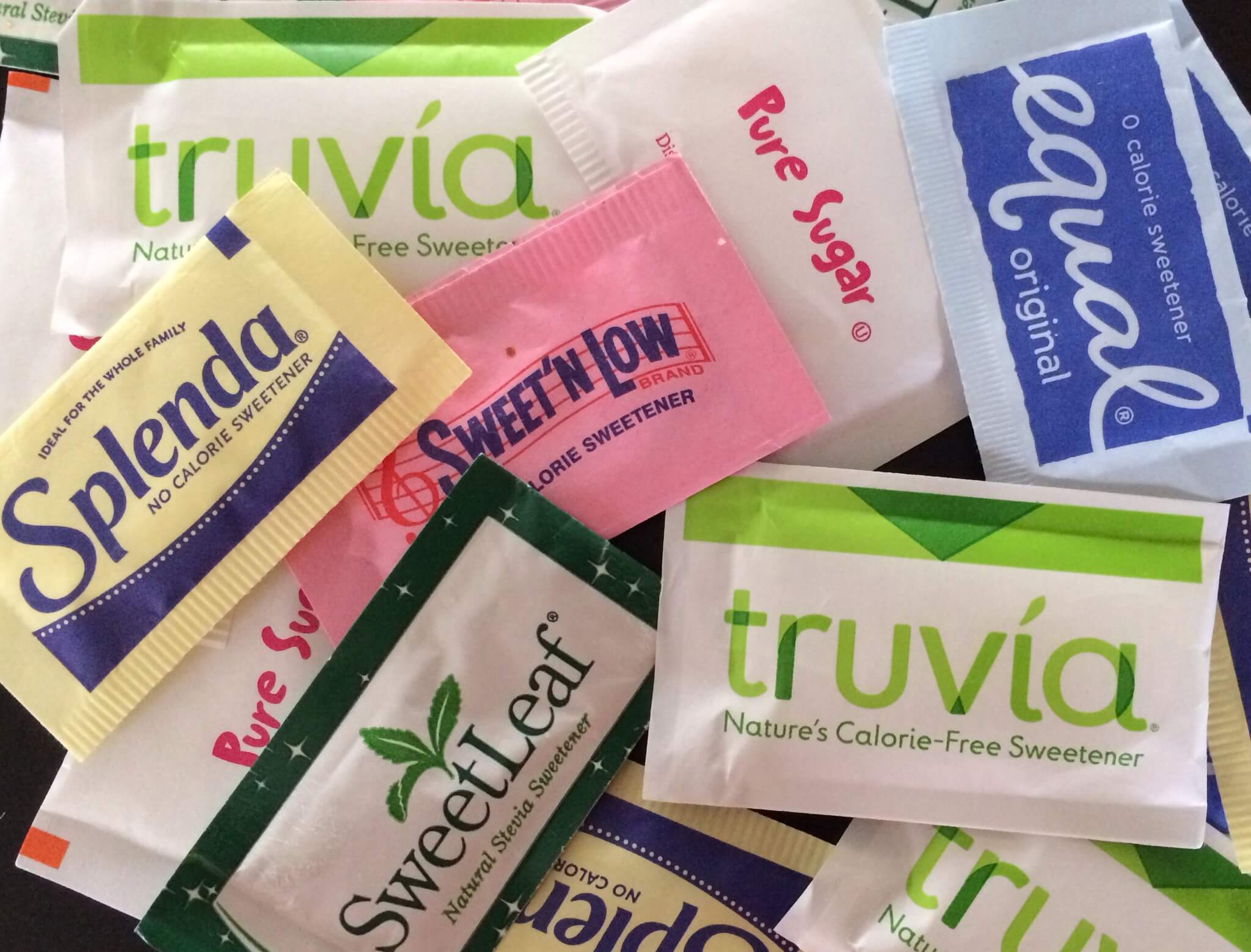
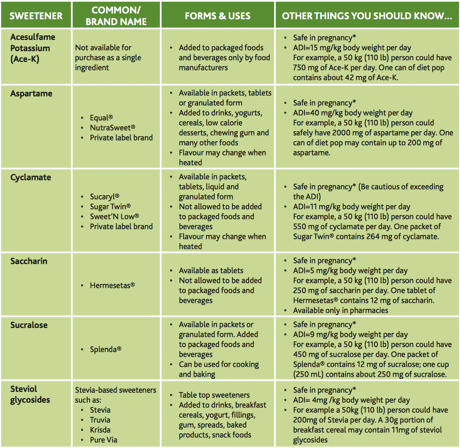
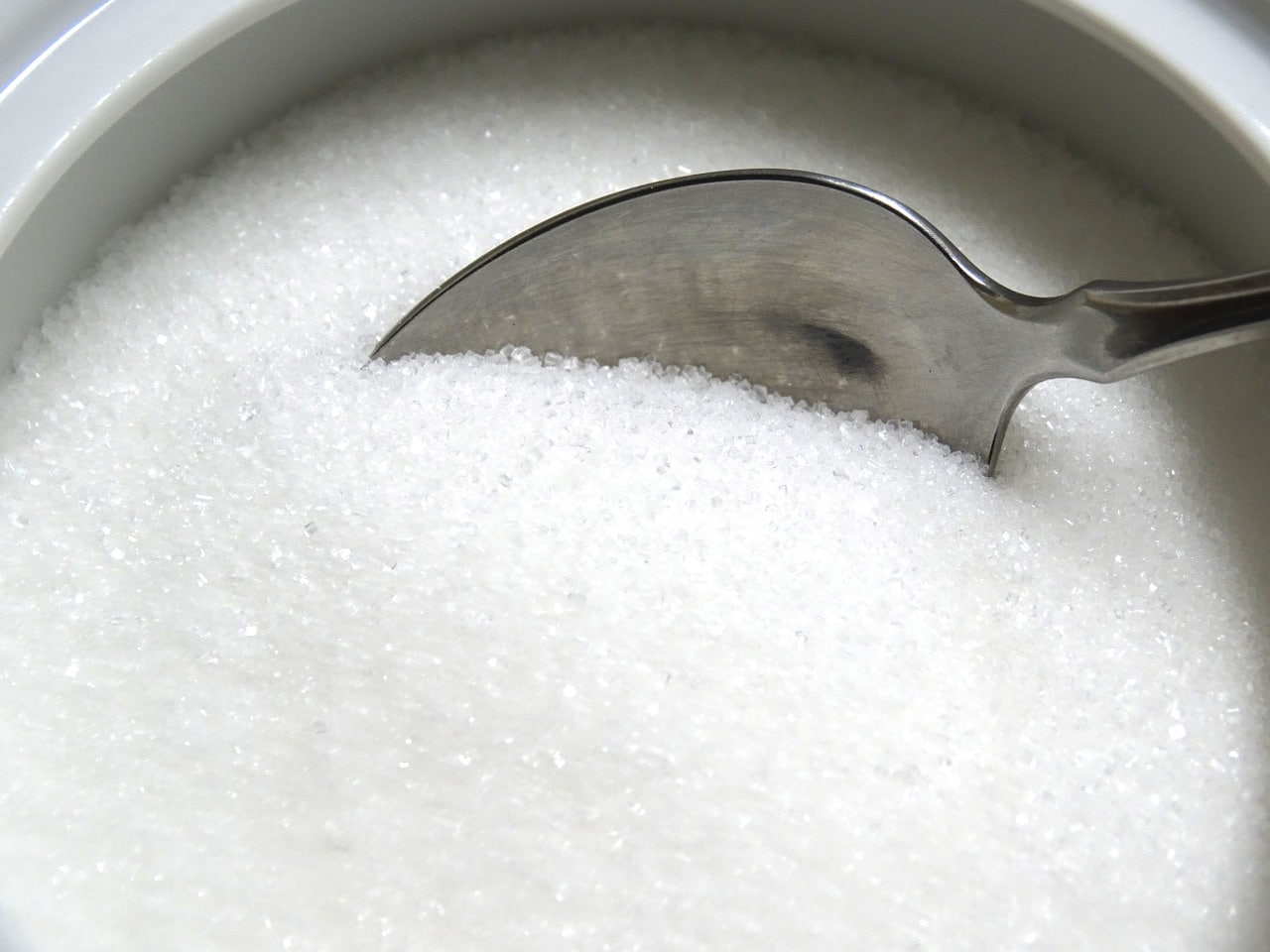

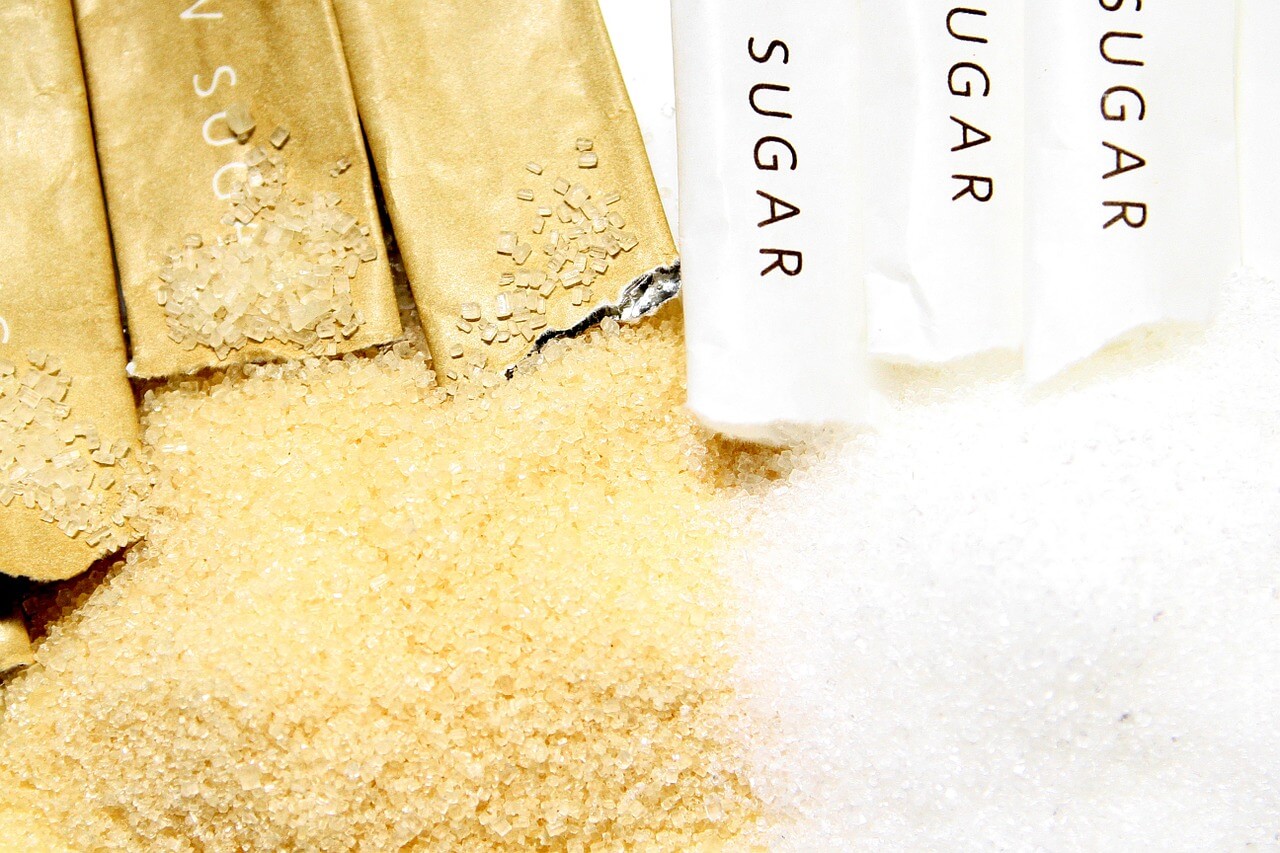
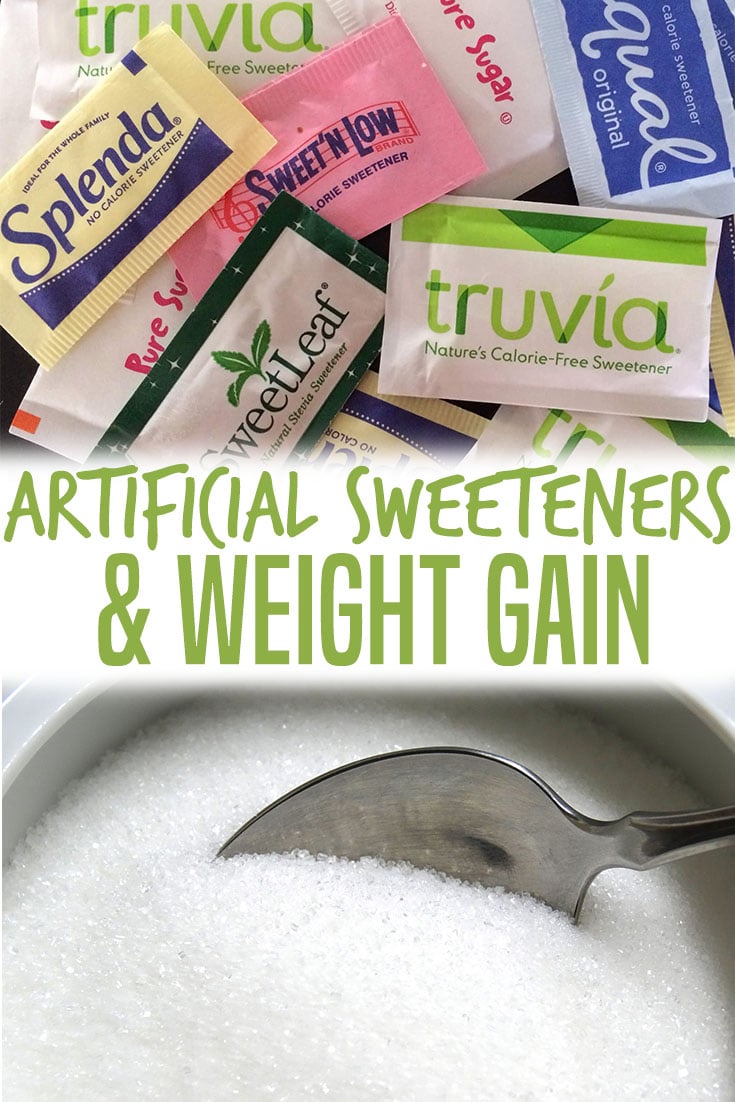

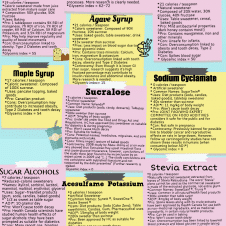
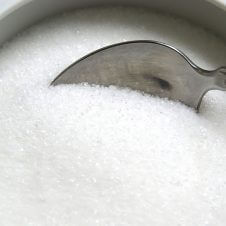

Dawn Owens says
I have battled this sugar problem for years, I have(had) high blood pressure for years. I went from sugar to AS and still had high blood pressure. It wasn’t until my doctor tried to prescribe me three different medications I decided to cut all sugar. I went from 170/100 to 120/80 without medication.
Jessica @Small Bites by Jessica says
Great info for Abbey! Thanks for sharing!
Abbey Sharp says
Thanks Jessica! Glad you liked it!
Alicia says
Great thorough post!! I’ve always tried to stay away from AS in all my foods. If it has the word ‘artificial’ in it, I won’t buy it.
Abbey Sharp says
Thanks Alicia!
Marianela says
Very interesting article =) Thanks for sharing. such an eye-opener.
Abbey Sharp says
Im so glad it was helpful!
JoJo Tabares says
Isn’t Truvia a natural sweetner? I thought it was Stevia. Isn’t that natural? I’m not allowed to eat sugar so I have substituted Stevia. I was told it was natural. I hadn’t gained weight in all the years I’ve used it until recently. But recently, I am in the last days of peri menopause…or so I hope.
Abbey Sharp says
Truvia has a bit of stevia in it (which yes, is natural) but it also has sugar alcohols in it which is why I avoid it. Also, just because something is “natural”, doesn’t mean it’s harmless in large amounts. I dont think there has been enough research on stevia for me to give it a total green light.
Ann b says
excellent arTicle. Thanks for the info.
Abbey Sharp says
so glad this was helpful!
Kim Seghers says
I had no idea artificial sweeteners can cause weight gain. This article is very informative. I need to just drink my coffee black and my tea with honey.
Abbey Sharp says
I dont think anyone needs to do anything drastic, but everything in moderation. I dont think they’re the answer to weight loss like we used to think
Lauren says
Ugh…i have yet to find an artificial sweetener my body can handle. i either get severe pain or bloating. i think it’s best to stick to natural sources in moderation 🙂
Abbey Sharp says
Agreed! everything in moderation – whatever you choose.